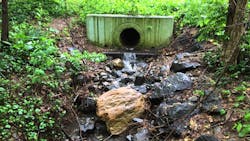EPA awards $2.7M to Virginia Foundation to research stormwater, water reuse
PHILADELPHIA, JUNE 29, 2016 -- The U.S. Environmental Protection Agency today announced two grants totaling $2.7 million to the Water Environment and Reuse Foundation (WE&RF) of Alexandria, Va. for water research projects that will benefit communities nationwide and in the Potomac watershed.
The grants include $1.95 million to develop tools that will help communities choose the best ways to control stormwater runoff and $750,000 for improving water reuse and water conservation in the Potomac watershed.
“EPA has done extensive research on green infrastructure, water reuse, and water conservation to help ensure the availability and quality of water in the United States,” said EPA Mid-Atlantic Regional Administrator Shawn M. Garvin “These grants will help take this work a step further by developing technologies that communities can use nationwide.”
The announcement was made at the Hampton Roads Sanitation District’s Chesapeake-Elizabeth treatment plant in Virginia Beach, where WE&RF is using a demonstration project to study new technologies for water treatment and water reuse.
“The Water Environment & Reuse Foundation is excited to continue our partnership with EPA to provide the science for next generation technology to meet our growing demand for clean water,” said Melissa Meeker, Chief Executive Officer for WE&RF.
Due to aging water infrastructure systems and regulatory requirements, stormwater management is an expensive challenge for many communities. WE&RF’s research on controlling stormwater runoff will focus on the most cost-effective options. This will include green infrastructure practices that enhance natural ecological functions, such as growing gardens on roofs or building artificial ponds, to help manage stormwater and combined sewer overflows.
Working with multiple universities, WE&RF will develop tools that communities can use to evaluate the costs and benefits for options to manage stormwater runoff and combined sewer overflows.
The funding for water reuse research in the Potomac watershed will examine the impacts of emerging contaminants on public and ecological health. Research will examine approaches and best management practices that facilities can use to prepare for the future.
